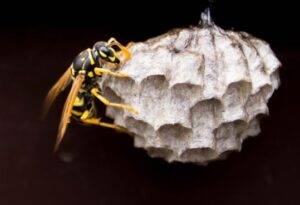Wasp Infestations.
Control and Prevention Guide
Guest Post by Natalie Ige
 Wasps are nothing to sneeze at, they are a serious pest, and you should take serious preventative steps to avoid an infestation. I
Wasps are nothing to sneeze at, they are a serious pest, and you should take serious preventative steps to avoid an infestation. I
f you have already missed that opportunity and they are in or outside of your home, don’t worry; controlling an infestation and getting rid of these pests isn’t impossible.
Wasps are a danger to adults, children and pets, not to mention the unsightly look of a wasp nest on your or near your home.
To set yourself up for the future, consider this guide to control and prevent wasp infestations.
Wasps are not a pest you should underestimate; they are a genuine threat to your safety. If you have wasps, controlling them and eradicating them can be tough.
You can do it yourself, but if you don’t feel confident then don’t try and take care of them.
One of the easiest ways to control wasp infestations is finding pest control in Melbourne.
A pest controller can assess the infestation, treat and also identify any other risk areas on your property.
Consulting with an expert can give you the peace of mind you need to sleep easy at night.
Fill in your cracks
Wasps love to burrow and nestle in cracks around your home, especially those in the windows or where people enter the home.
Take the time to inspect your windows, walls and any external entry points for cracks and spots where wasps may like to nest.
If you find any of these areas, be sure to fill them immediately.
This is a simple process that can help prevent serious infestations as wasps will no longer view your perfect home as their perfect home either.
One of the best times to do this exercise is in autumn, which is when most wasps will be inactive or have died.
This lowers the risk of being stung or filling in cracks with wasps still inside.
Clean up your bins
Bins are a major source of attraction for wasps; they love both the source of food and the opportunity to nest under the handles of the bins.
Your typical wasp and the dangerous European wasp have many similarities, especially when it comes to how and where they infest.
Both wasp infestations can quickly get out of control if there is an easy and simple food source close by.
Limiting the chance of food waste being accessible is the best way to prevent wasps in your home.
If you can, sealing your bins to ensure there is no chance of food escaping is the best way to prevent wasps from having a food source.
Don’t take your recycling for granted either, be sure to seal all of your bins.
Even recycling waste can harbour food scraps that wasps love to feast on.
Look out for holes
Certain types of wasps aren’t picky when it comes to choosing a home and will even nest in the dirt.
To prevent any of these types of nesters, be sure to check your lawn or yard for holes and fill them in.
It doesn’t have to be large holes either. Look for small holes or any potential spots for tunnelling as wasps love to build nests that tunnel.
Take the time to fill the hole in properly and compact the dirt to ensure no nasty little pests can build a nest and create an infestation.
Wasps are a pest you don’t want to deal with and will want to get rid of if you do have an infestation.
Whether you need professional help or need to spend some time wasp-proofing your home, you’ll want to invest the time to do it properly.
If you need help learning how to prevent or control a wasp infestation then you can also call a pest control service for extra help.<